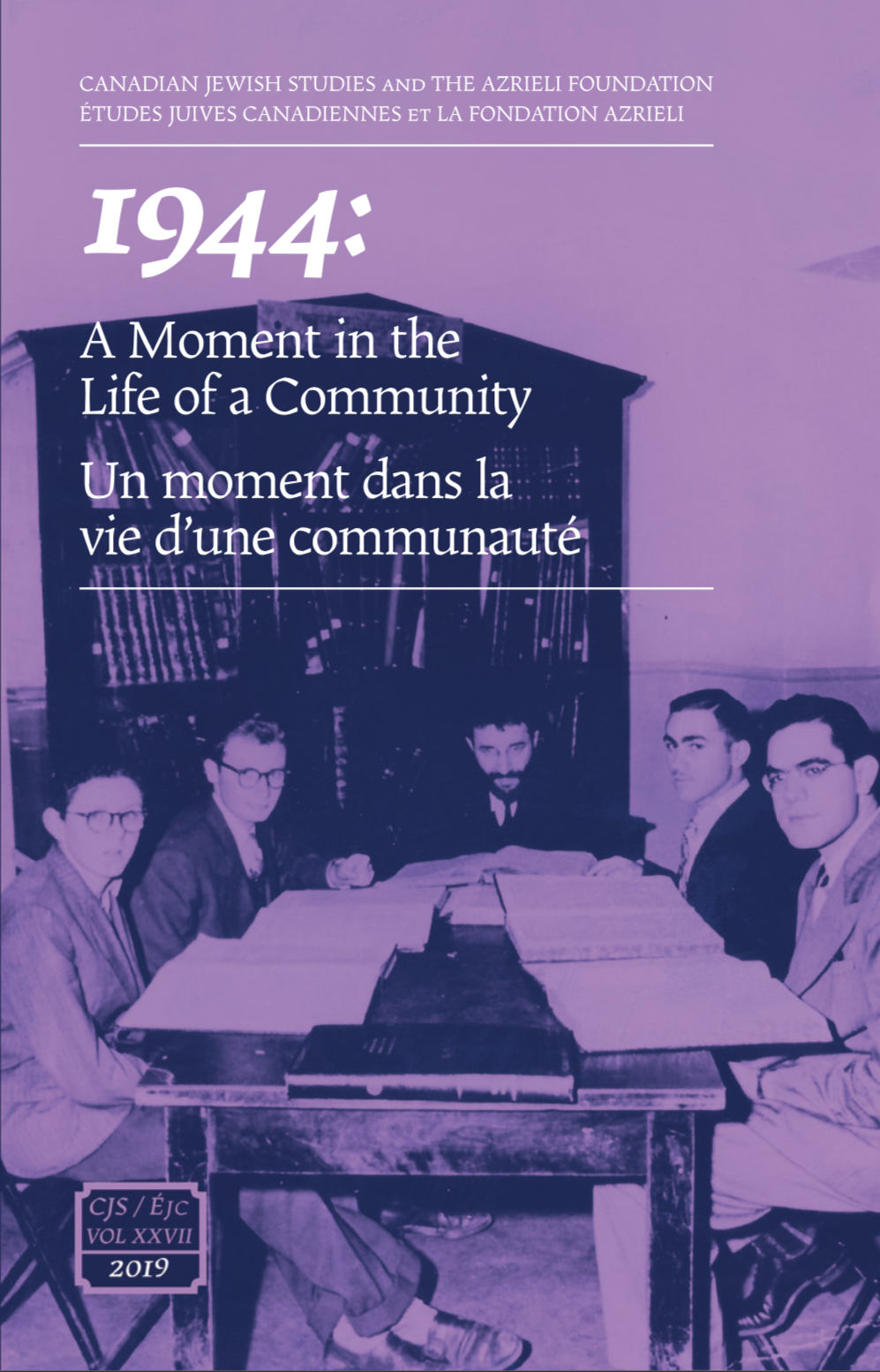“There were cries of joy, some of sorrow”: Canadian Jewish Soldiers and Early Encounters with Survivors
DOI:
https://doi.org/10.25071/1916-0925.40108Abstract
A close study of the early contacts between Canadian Jewish soldiers and survivors reveals many of the features largely associated only with the “liberation” of the camps in 1945. Already in 1944, in France, Belgium and the Netherlands, Canadian soldiers had encountered evidence of the Holocaust, especially the stories of deportations, deprivation and loss told by Jews emerging from hiding. Many soldiers heard the stories, were deeply affected by them, and reached out to the survivors and wrote about their experiences to family members. Some accounts of these encounters appeared in the Canadian Jewish press. These accounts fed into a homefront discourse and strategy, encouraged by the Canadian Jewish Congress, which sought to demonstrate to both Jews and non-Jews the role of Canadian Jews in the war effort and the need to help European Jewry.References
Canadian Jews in World War II. Part I: Decorations (Montreal: Canadian Jewish Congress, 1947); Part II: Casualties (Montreal: Canadian Jewish Congress, 1948).
Canadian War Museum (Ottawa), J. Greenblatt fonds, Accession number 19990209-002, file 58A 1 155.3-6, Joseph Greenblatt to Francis Trachtenberg, 17 October 1944.
Chaya Brasz, Removing the Yellow Badge: The Struggle for a Jewish Community in the Postwar Netherlands, 1944-1955 (Jerusalem: Institute for Research on Dutch Jewry, 1995), 43-47.
Dan Conlin, War through the Lens: The Canadian Army Film and Photo Unit, 1941-1945 (Niagara Falls, ON: Seraphim, 2015), 46.
Dan Stone, The Liberation of the Camps: The End of the Holocaust and its Aftermath (New Haven: Yale University Press, 2015).
Deborah Dash Moore, GI Jews: How World War II Changed a Generation (Cambridge, MA: Belknap Press of Harvard University Press, 2004).
Derek Penslar, Jews and the Military: A History (Princeton: Princeton University Press, 2013), 1-2. DOI: https://doi.org/10.1515/9781400848577
E.E. Urbach, Reshimot bi-Yeme Milchamah: Yomano shel Rav Erets-Yisraeli ba-Tsava ha-Briti, 5702-5704, 1942-1944, ed. by Chanah Urbach et al. (Tel Aviv: Misrad ha-Bitachon, 2008), 252.
Gerald Tulchinsky, Canada’s Jews: A People’s Journey (Toronto: University of Toronto Press, 2008), 371-6. DOI: https://doi.org/10.3138/9781442687486
Israel Medres, Between the Wars: Canadian Jews in Transition, translated into English by Vivian Felsen (Montreal: Véhicule Press, 2003), 114-117.
James Walker, “Claiming Equality for Canadian Jewry: The Struggle for Inclusion, 1930-1945,” in Nazi Germany, Canadian Responses: Confronting Antisemitism in the Shadow of War, ed. L. Ruth Klein (Montreal and Kingston: McGill-Queen’s University Press, 2012), 237-239.
Jeffrey A. Keshen, Saints, Sinners and Soldiers: Canada’s Second World War (Vancouver: UBC Press, 2004), 39-40.
Library and Archives Canada (Ottawa) (herea"er: LAC), Samuel Cass fonds, MG 30 D225, vol. 3, file 5.
Mark Celinscak, Distance from the Belsen Heap: Allied Forces and the Liberation of a Nazi Concentration Camp (Toronto: University of Toronto Press, 2015). DOI: https://doi.org/10.3138/9781442668775
Norman Erwin, “The Holocaust: Canadian Jews, and Canada’s ‘Good War’ Against Nazism,” Canadian Jewish Studies 26 (2016), 117-118.
Richard Menkis, “‘But you can’t see the fear that people lived through’: Canadian Jewish Chaplains and Canadian encounters with Dutch survivors, 1944-1945,” American Jewish Archives 60, no. 1-2 (2008): 24-50.
S. Gershon Levi, Breaking New Ground: The Struggle for a Jewish Chaplaincy in Canada, ed. David Golinkin (Montreal: National Archives Canadian Jewish Congress, 1994), 65.
Downloads
Published
How to Cite
Issue
Section
License
Canadian Jewish Studies/ Études juives canadiennes is a journal dedicated to the open exchange of information; therefore the author agrees that the work published in the journal be made available to the public under a Creative Commons Attribution-Noncommercial-No Derivative Works 4.0 Unported License. The publisher (Association for Canadian Jewish Studies / Association d'études juives canadiennes) recognizes the author's intellectual property rights; authors retain copyright over their work. The author grants the publisher first serial publication rights and the non-exclusive right to mount, preserve, and distribute the intellectual property. The journal is digitized and published on the open access website http://pi.library.yorku.ca/ojs/index.php/cjs/index.







